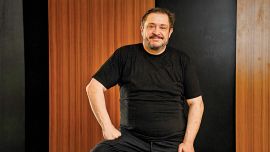The new report by the Center for the Study of Democracy (CSD) highlights Moscow’s intention to influence political and economic elites through trading relations, shared-ownership companies and the cultivation of personal links with key figures.
These efforts, outlined in Global Reach: The Kremlin’s Playbook in Latin America, are part of a plan to create a network of allies who can defend Russian interests within political and economic spheres, altering the region’s geopolitical alignment.
On the one hand, there is a trading strategy with a view to co-opting vulnerable sectors of the economy. On the other, the use of political organisations and personalities to exercise informal influence.
These are the report’s main findings, focusing on Argentina.
Infrastructure
Russia intends for greater involvement in Argentina's economy, chiefly in infrastructure projects linked to hydrocarbon or transport exploration, as well as energy and mining.
Even though plans proposed in the last few years have not materialised, the very prospect of fresh investment has allowed Moscow to approach key economic and political players. This dialogue often extends beyond mere cooperation and touches on wider geopolitical issues in which Russian interests are at stake.
Agriculture and food
Argentina’s heavy dependence on agricultural exports has provided Russia with a new tool for economic influence. For example, only in 2022, Argentine imported urea ammonium nitrate solution (commonly known as UAN), a liquid fertiliser with a nitrogen content, for a total of over US$76 million. In addition, in 2019, then-Agriculture secretary Luis Miguel Etchevehere and Russia’s deputy Agriculture minister Sergey Levin signed an agreement related to agricultural biotechnology and biosecurity which enabled 25 Argentine fishing companies to enter the Russian market.
Between 2014 and 2015, Argentina’s government sought to promote the import of Russian agricultural products by signing trading agreements to the tune of around US$2 billion. Though many of these agreements came to nothing, over the last decade, Russia has become the second-biggest market for Argentine meat.
Trade has expanded beyond foodstuffs to several other products, including agricultural machinery, steel pipes, clothing and footwear.
Hydrocarbons
In 2008, Russian company Lukoil pledged an investment of US$500 million to build a fuel storage facility and a pipeline towards the main fuel exporting terminals in Argentina. In exchange, state-run company Enarsa would buy liquid fuels for five years for the new Manuel Belgrano power plant in Campana.
In 2017, Lukoil attempted to facilitate a capital investment of US$80 million as part of a strategic investment to inject US$300 million into Grupo Indalo. The following year, the Russian firm supplied Oil Combustibles SA, from the same group.
These types of agreements illustrate how Russian companies can exploit an existing informal influence network, involving private interests that are politically well-connected, in order to avoid competitive procedures in a crucial sector of the Argentine economy.
In the gas sector, Gazprom and Novatek have pushed to join the development of the Vaca Muerta formation. In 2014, the former sought to purchase a share of US$1 billion in the exploration of a field, but it only signed a confidentiality agreement with Pampa Energía seven year laters.
In 2023, Novatek, the biggest LNG producer in Russia offered YPF a new technological solution for gas liquefaction. However, negotiations were eventually halted.
In 2022, Argentina imported Russian diesel oil worth nearly US$43 million.
Nuclear power
In 2015, during former president Cristina Fernández de Kirchner’s government, Nucleoeléctrica Argentina SA and Rosatom signed an agreement to build a fourth nuclear plant in Argentina, though there was no progress. Even so, Rosaton kept its perspectives alive by reaching a new cooperation agreement with her successor as president Mauricio Macri in 2018, during the G20 summit in Buenos Aires.
Ever since, the Russian government has continued to discuss collaboration on nuclear power projects, but received no specific answers during Alberto Fernández’s Presidency.
With President Javier Milei now in power, it is unlikely that Russia will earn a strategic position in Argentina’s nuclear industry. Moscow still has offers on the table and has proposed other forms of nuclear cooperation, including small state-of-the-art modular reactors and floating nuclear power plants.
Between 2013 and 2020, JSC Isotope, a subsidiary of Rosatom, supplied Argentina with molybdenum-99 radioisotopes. Initially, the exchange through Laboratorios Bacon was irregular and was confined to the supply for the technical service period of Argentine reactors, when local production was suspended for maintenance.
In 2018, cooperation became more intense when the Argentine company signed a new two-year contract establishing the weekly supply for use in nuclear medicine. Upon termination of the contract, the laboratory was then supplied by Canadian company Huayi Isotopes Co. and German company Eckert & Ziegler.
The impending opening of the RA-10 reactor in Ezeiza is expected to ensure self-sufficiency in medical radioisotopes, thus limiting dependency on Russia.
Arms
In 2010, Russia stated its interest in selling arms to Argentina, but the government rejected most proposals, except for an agreement to buy two MI-17 helicopters.
During Alberto Fernández’s term in office (2019-2023), Moscow offered 12 MiG-35 fighter planes, as well as the construction of a facility to maintain aircraft and train pilots. However, in March 2024, Milei’s administration chose to sign an agreement with Denmark to buy 24 F-16 fighter planes made in the United States
In 2021, the Defence Ministries of both countries agreed to admit Argentine military officers into Russian training institutions. Once Milei got to power, he announced that this agreement would not be implemented, though it would not be terminated either, keeping it in force to avoid a breach conflict.
The presence of four Military Attachés at the Russian Embassy in Buenos Aires, as official representatives of the Defence Ministry of the Russian Federation, marks the geographic revelation of Argentina as a gateway to Antarctica.
Transport
Putin announced in 2018 that state-owned Russian Railways wanted at building a 700-kilometre rail line to connect Vaca Muerta with the Bahía Blanca port. Yet, by 2021, Argentina had already moved forward with a similar project with a Chinese firm.
Russian company TMH International was awarded the concession of railway workshops in Mechita via a 170-million-euro investment plan and with the promise to create 1,200 jobs. However, the actual investment was only US$3 million and, in 2023, TMH sold its concession to Argentine company CaleGroup.
Argentina’s Transport Ministry put a contract awarded to TMH for the supply of 70 electric cars on hold after the invasion of Ukraine.
Media
Russian channel RT has been part of the TDA Open Digital Television following an agreement signed by then-president Cristina Fernández de Kirchner and Russian leader Vladimir Putin in 2014. Russia does not pay any compensation to the government for this.
In 2016, Mauricio Macri’s government tried to suspend the broadcast of RT, but Russian threats of withdrawing funds for a dam project in Neuquén forced the reversal of this decision.
When he became head of state last December, President Javier Milei ordered the suspension of Venezuelan network Telesur, but there were no announcements about RT.
Since September 2022 Radio Rebelde, owned by union leader and picketer Luis D’Elía, has broadcast the Pax Russika programme, disseminating a foreign policy view particularly close to Moscow’s positions. Russian diplomats, journalists and analysts often take part.
Links
The electoral defeat of Peronism in 2023 saw many former government officials who had kept strong links to Russia ejected from office.
Though diplomatic relations have waned remarkably, Moscow maintains ways to influence Argentine politics and public opinion. Most Pro-Russian connections are still alive, especially among Peronist politicians.Both former and current officials have taken part in various conferences in Russia recently.
In 2024, the Parliamentary Group for Friendship with Russia was formed once again, which is aimed at promoting cultural and parliamentary exchanges. The Valdai Discussion, founded in Moscow in 2004, is a key element regarding academic links.
Drug-trafficking
Large-scale investment agreements undermine the local corporate atmosphere when the government or Argentine companies establish non-transparent associations with politically exposed intermediaries from Russia. Moscow thus achieves a relevant influence on a local and regional level. Yet formal and informal ties alike help unmask the transfer of funds from corruption or drug-trafficking.
Argentina is a big producer of chemical precursors and, therefore, vulnerable to the production of illegal narcotics, and especially as a point of transfer to Europe. The most notorious case happened in 2016, when the Russian Embassy in Buenos Aires was used as a site for the attempting smuggling of nearly 389 kg of cocaine stashed in suitcases.
* Ignacio E. Hutin (Master's in International Relations, USAL, 2021) is a journalist and researcher. He served as the advisory counsel to CADAL, which provided the local research for the Global Reach: The Kremlin’s Playbook in Latin America report, published by the Center for the Study of Democracy (CSD), a think tank founded in 1989 and based in Sofia, Bulgaria.
related news
by Ignacio E. Hutin*




















Comments